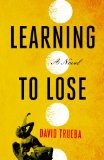Write your own review!
Denice B. (Fort Bragg, CA)
Learning to Lose
The language of Learning to Lose is wonderful (is it the writer, translator, or both?), though the book is a little too long. At about page 150, I wanted things to move along a bit more, but all in all, a uniquely woven story with well-developed characters, most of whom I cared about.
Anita P. (Honeoye Falls, NY)
Worthy literary read for book clubs or the classroom
This book gets kudos on several fronts - - its realistic portrayal of relationships, its incredible depiction of the male point of view of love and loss, and its subtle reflections on death. A lot happens in "Learning to Lose", but none of it is over dramatized or maudlin . . .and that's in part that the author took his time weaving his tale of three unique, but connected, relationships. Unfortunately, the pacing of the book wasn't quite right for me - - it's very long and parts of it were slow. However, in this case, I think the slower pacing was merited as it really let you feel the evolution of the characters
…more in such a realistic way. (less)Three generations of one family in Madrid--grandfather, father, and daughter--and a rising-star soccer player from Buenos Aires, are struggling with inner demons as well as external chaos and change. The novel opens when Sylvia's father, Lorenzo, has murdered a man who is responsible for his financial failures. His 71-yr-old father, Leonardo, an unsuccessful pianist, is addicted to a Nigerian prostitute. Sylvia, only 16, meets and has a secret love liaison with Ariel, the charismatic 20 -yr old soccer player. Aurora, Leonardo's wife, is slowly dying.
This erudite and observant story drew me in gradually. It could
…more have kept me on the edge of my seat; however, the author, while not losing focus, does meander and clog up the story occasionally with superfluous detail. But, superb characterizations--this is where the author shines. (And you'll learn a lot of tasty nuggets about some of the great classical composers.) Wry and aware. An unpredictable but satisfying ending. Truthful, laconic, redemptive and thoughtful.
Will Lorenzo get away with murder? Will Sylvia and Ariel go public and survive the odds? What kind of disasters await Leonardo? Read the book to find out. (less)I always like to read stories that take place in other countries; usually, however, they also take place in another time. What's great about Learning to Lose is that it's a contemporary novel that shows the more we know people in other countries, the more we'll see they're just like us. Dealing with divorce, changing marriage roles or the troubles fame and promises of fortune can toss your way, these characters are very likable in all their faults and failures. The writing is very good with plenty of engaging details and parallels in the story. A good read!
Liz C. (Portage, MI)
Learning to Lose
David Trueba is an intelligent, insightful writer. He brilliantly captures the lives of his characters, which include a sixteen year old girl, a twenty year old professional soccer player, a middle aged man, and his elderly father. His ability to portray the actions and innermost thoughts of such a diverse group of individuals in such detail and so honestly is remarkable. (Sylvia is one of the most mature, self-aware sixteen year olds I’ve encountered in fiction, but nonetheless is authentic and believable.) As much as I enjoyed reading Learning to Lose while I was reading, it wasn’t a book I was eager to pick
…more up once I’d put it down. I found it a little short on action, and at nearly 600 pages, very long, too long. I am happy to have had the opportunity to read this Spanish writer I may not have otherwise encountered; I would recommend Learning to Lose to those who enjoy international literary fiction. (less)From the minute I started reading this book I knew I was embarking on a trip with an extraordinary writer. We are seriously considering this title for our book club because it has all the elements that get a good conversation started.
Morality, sexuality, reality, and other ...ity's. All are dealt with in an original and invigorating approach.
Eileen F. (Drexel Hill, PA)
Living in Madrid
This would be a good book for clubs because of the many moral questions it raises about modern urban life. The characters are repeatedly faced with choices that change their lives and futures. They also have complicated relationships with one another. My biggest problem with the book was its length. The story did keep you wanting to see how things turn out.
Rebecca C. (Opelika, AL)
A Deep and sensitive read.
I was slightly surprised when reading this book. I always think of immigration as being mainly to the US, but don't think much about it in other countries. Trueba has faced not only family issues straight on, but immigration and prejudice issues in Spain. Just one small moment in this story can change a life forever or sends a person down a path they never dreamed of taking. The writing bounces between tenses like a ping pong ball which keeps you hopping. The only reason I did not rate the book higher was I felt that no one family could possibly have so many accidents, bad decisions, poor luck and accept it all
…more so willingly. I do really enjoy reading international fiction and getting to know new authors and new cultures better. This book was no exception. (less)
